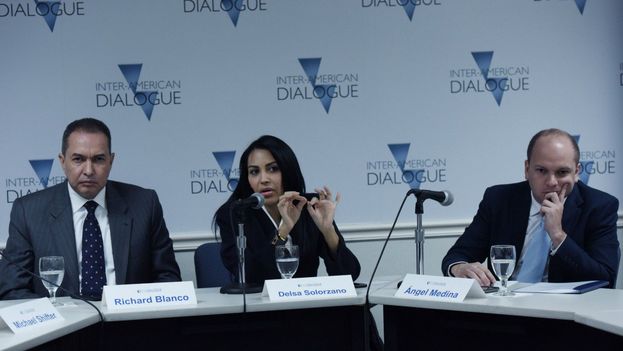
14ymedio, Henry Constantin, Washington, 2 May 2016 — “There is nothing: No power, no water, no supplies in hospitals, there is no aspirin, no food, no security,” said Venezuelan Deputy Angel Medina in a debate on Venezuela organized last week by the Inter-American Dialogue Center of Georgetown University in Washington, D.C.
“Venezuela is worse than Cuba,” added Delsa Solorzano, another of the six deputies from different parties grouped within the Democratic Unity Roundtable, which won an absolute majority in the last general elections but which does not control the executive power in Caracas. These parliamentarians are participating in a tour to seek solidarity for the release of political prisoners and for the desperate situation Venezuela is experiencing.
“In one of the neighborhoods where we went to campaign, I visited fifty houses, and all of them I asked to look, first of all, in the refrigerator. All had empty fridges. One lady told me she had only a piece of sausage, and six children to feed, ‘How do I do that?’ she said,” recounted one of the deputies present.
“In some places the government has threatened people that if they sign for the recall [of Maduro], they will take away the things they received.” And people tell them, “But we don’t have anything, what are you going to take?” said another of the deputies present.
Included in this tour, undertaken by opponents of the Maduro government, is a meeting scheduled with Luis Almagro, Secretary General of the Organization of American States—who has also been critical of the anti-democratic stance of Maduro’s government—as well as a meeting with the Washington Post, which has published strong editorials against the Venezuelan government.
“We believe in diversity [of opinion] and in Venezuela we want diversity of opinion to no longer be a crime. Right now we have people who are political prisoners simply for writing a tweet,” said deputy Solorzano, who at the end of the event was very warmly by many of the Venezuelan émigrés present.
“Venezuela needs everything. Right now, if you can participate in donating medications that would be very good. And also, those of you who are bilingual, you can translate our messages to that more people can learn what we are experiencing and support us. This is very important,” commented Solorzano, who is also the vice-president of the Domestic Policy Committee of the National Assembly and a member of the opposition party A New Time, which receive the most votes in the last election.
“You have to stay united,” urged members of the audience, mostly made up of young professionals and students. “We are and we will be after the victory, it is not enough to win an election. We must rebuild Venezuela. We make decisions unanimously and discuss all our differences, but we always make it clear that we must act together.”
“But you have to have a strategy, what is your strategy?” protested a lady in the audience, to whom Delsa Solorzano responded, “We have a strategy, and every step that has been taken as been thought through very carefully. What we do not want to do is announce our strategy. And stay tuned, because in peace, without violence, in the coming months very good things are going to happen.”
